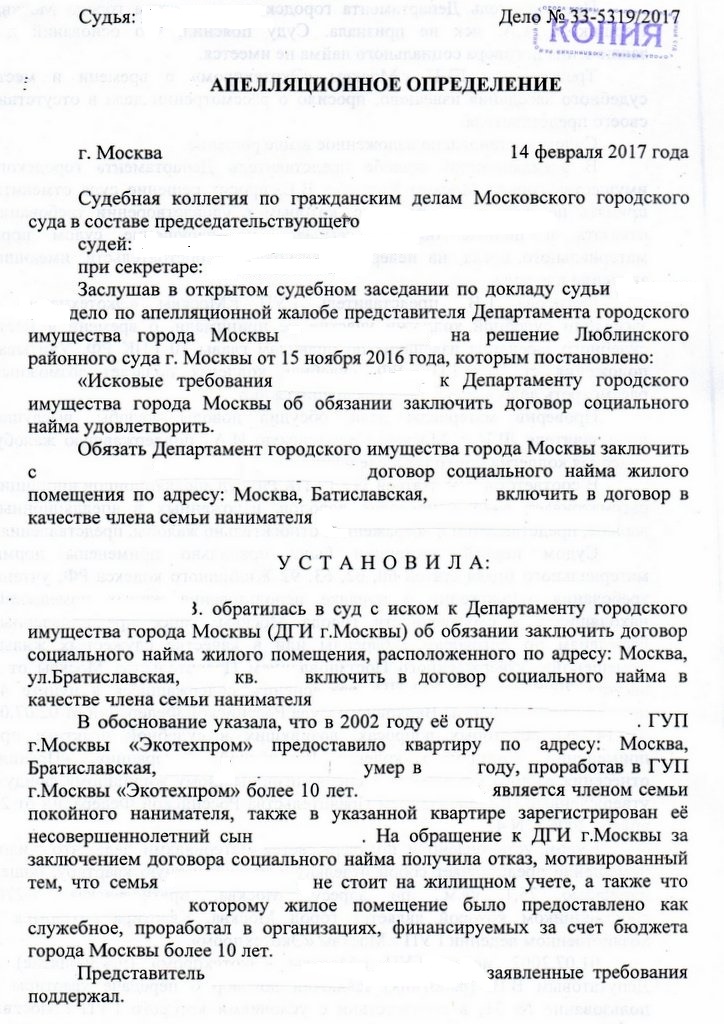In modern legal practice, quite often you can find such a thing as a “definition of an appeal in a civil case”. Let us consider in more detail the main significance of such a document during the trial and the list of its integral elements.

General concept
Before you consider the features of such a document as the determination of the court of appeal in a civil case, it is important to note its general concept, which is quite common in legal literature.
So, the document described is the decision made during the review of the case by the court of second instance, assigned to the appeal category. The document must certainly be drawn up in accordance with the established requirements, and also contain in its text a decision made by the court. As for the sample appeal ruling in civil cases, they can be found on the official websites of the judicial authorities of the second instance. Also an example of such a document can be studied below.

Normative regulation
It is important to note that all actions related to the issuance and application of appeal rulings are carried out in strict accordance with the norms of Russian law.
In particular, the main concept of the document, as well as some features of its structure and movement, are provided for by the content of the Civil Procedure Code of the Russian Federation. In addition, the features of such an act are often considered in documents issued by the Supreme and Constitutional Courts.
Key Features of Appeals
It is important to note that the appeal rulings in civil cases have some peculiarities. The first of them (the main one) is that the determination issued by the court of second instance has the property to enter into force immediately after its publication, and not within 30 days, as happens with the decisions of local courts. It is important to note that in the case of appeal rulings in civil cases, it would not be appropriate to extend the time limit for appeal, as is permissible in cases with similar documents issued by bodies of first instance.
It is worth noting that Russian legislation nevertheless provides for the possibility of appealing against decisions made by the courts of appeal - this is done on appeal, by filing an application with the Supreme Court. By the way, experienced practicing lawyers often notice that such an action is the only legal and effective way to influence the decision made, but which did not satisfy at least one of the parties to the proceedings.

Who makes the determination?
The legislator determines a certain circle of judicial structures and instances that are entitled to make an appeal ruling in civil cases. These include all those courts that are assigned to the second instance by the hierarchy system. In a number of such may be the following types:
- regional;
- regional;
- Supreme Courts of individual Russian republics;
- The Supreme Court of the Russian Federation;
- city courts located in cities with federal status.
It is important to note that the district courts can also act as an appellate court, but only in the event of a review of decisions taken by justices of the peace.

How are definitions made?
Special attention should be paid to the particularities of the adoption of rulings in civil cases in appeal instances. It is important to note that this process can take place collectively, with at least three judges.
As for the detailed decision-making procedure, it is prescribed in the procedural codes (in particular, in civil cases - in the Civil Procedure Code). Based on the provisions presented in the said act, the judicial board shall issue an appeal ruling in civil cases in a specially equipped deliberation room in which unauthorized persons cannot be present for the duration of the negotiations. The legislator provides that in case of violation of such a rule, the decision is recognized as illegal and is subject to automatic cancellation.
After the appeal decision of the SC in a civil case is accepted and formed, it must be announced by the presiding judge in the presence of all interested parties and other citizens (if any). It is important to note that, as a rule, the process of publication takes place partially, and in full it is presented after some time (usually about a week).
Act time
It is important to note that all the features of drawing up court decisions are spelled out in the content of procedural acts of a regulatory nature. The procedure for drawing up and subsequent issuing of a ruling adopted by the court of appeal is no exception.
It is worth noting that the legislator provides for a strict structure of the document, and also puts forward certain requirements for its content, but does not limit the process of compiling special requirements in any way, meaning only that it takes 5 days to complete the process.
The act must be submitted in paper form, and its content is set forth in Russian. If a different language is spoken in the region where the court is located, an official translation into it can be made.
Definition Content
The procedural law defines clear requirements for the structure of the appellate ruling, which must be followed in compiling this type of document.
First of all, pay attention to its structure. So, the following data must be indicated in the content of the document:
- decision making time;
- the number of the case on which it was taken;
- settlement (must indicate the district, region and city);
- the exact name of the court (full);
- a list of persons included in the board conducting the review of the case;
- information about the secretaries keeping the minutes during the meeting (if replacements were made in the process, it is also necessary to say about them);
- title of the act - “Appeal ruling”;
- the essence of the earlier decision (the one that was issued by the court of first instance);
- circumstances and facts established by the board of appeals;
- motives that guided the board members in the decision-making process.
At the very bottom of the last page of the document must be indicated the data of all the judges included in the structure of the collegium involved, as well as their personal signatures with decryption.
Is it possible to cancel the act adopted on appeal?
It is important to note that the type of document in question can be canceled in a certain order established by regulatory acts. We will tell in more detail about this process.
Appeal of an appeal ruling is made through a specific process. To this end, the interested party should file a complaint of the appropriate content with the court authorized to resolve such issues - it has the status of a cassation instance (Supreme Courts of individual entities or an all-Russian body, as well as courts located in cities of federal significance).It is important to note that in such structures a whole presidium of courts is involved in the consideration of cases.
Let us further consider in more detail the features of the procedure for appealing appeal rulings in civil cases.

Terms of appeal of the determination
Particular attention should be paid to those periods during which the procedure under consideration is possible. The legislator determines that the term for appealing an appeal ruling in a civil case is six months. The countdown process starts from the date the appeal decision was made by the judges.
Practicing lawyers often note in their works that the indicated period is quite enough to decide whether it is worth litigating further or not.
Who can file a complaint
It is important to note that the legislator defines a list of those persons who have the right to initiate the revision of rulings in civil cases issued on appeal. These include:
- the prosecutor, who remained dissatisfied with the decision made by the court;
- any party to the revised case;
- any other person who affects a decision made by a court.
It is important to note that before preparing the appeal to the cassation instance, it is important to wait until the full text of the appeal ruling has been handed over.

How to apply
In order for the appeal ruling to be revised on appeal, a person who does not agree with the decision made by the judges must write a statement and submit it to the court of the corresponding instance, following the rules of jurisdiction. The text of the statement must include:
- standard heading of the document indicating the persons involved in the case, and their contact information;
- general data of the case in respect of which the appeal decision was made;
- summary of the definition;
- a list of the reasons on the basis of which the decision should be reviewed;
- a list of those legal norms that, in the applicant’s opinion, were violated by a panel of appellate judges;
- request addressed to the panel of judges of the cassation instance;
- wording of proposed decisions;
- applications, among which, by all means, there must be a receipt on payment of the state duty in the established amount.

Features of appeal against the ruling issued by the court of appeal
It is important to note that the procedure for appealing an appellate decision in a civil case has some features that are also worth mentioning when considering this issue.
First of all, it is important to understand that when considering a complaint on appeal, the court does not have the right to engage in the procedure for establishing any new facts that have not been taken into account by the judges conducting the case earlier. The review procedure should be carried out exclusively within the framework of the permissible powers prescribed by Art. 329 CAS RF.
As a result of the study of the materials, the panel of judges must decide:
- dismissal of the complaint and full support of the earlier decision set out in the body of the appeal ruling in a civil case;
- amendment of previously adopted acts;
- initiation of a full review of the case, followed by a more detailed study of the materials and clarification of its circumstances.
The peculiarity of the process of appealing appeal rulings in civil cases of district courts (or any other instances) also lies in the fact that a decision made in this order tends to take effect instantly. It is also subject to challenge, but only in the manner of supervisory review.
Can a cassation appeal remain pending?
This question often worries inexperienced lawyers. As experts in the field of jurisprudence note, such a development of events is quite possible, but there must be some reason for this.
The list of grounds in the presence of which a complaint filed with the cassation instance may be ignored includes:
- lack of payment of state duty;
- skipping the admissible deadline without valid reasons;
- content of the submitted document not provided for by the norms of Russian legislation;
- a formal request for withdrawal of a complaint;
- filing an application with an inappropriate authority or in violation of the rules of jurisdiction;
- filing a complaint from a person who is not in the circle of admissible.

It is important to note that if there is a legitimate refusal to consider the complaint, the application must be returned within ten days with a notice to the person about it.
If all the requirements established by law have been met, then the complaint begins to move. One calendar month is allotted for its consideration by the court of cassation, regardless of whether it is necessary to conduct a claim for the case or not. In the event that the body of the complaint contains questions related to the conduct of electoral activities, the period allotted for its consideration is reduced to 5 days.
